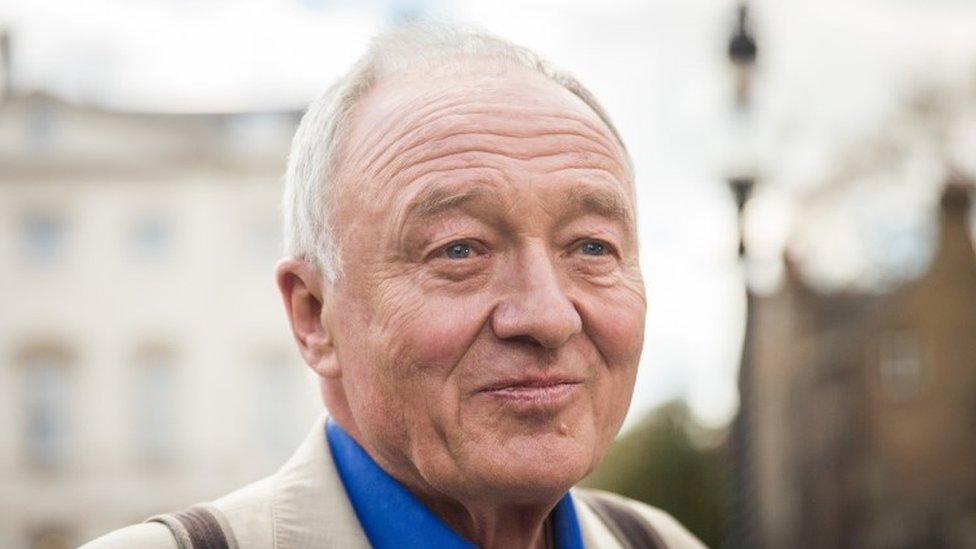Livingstone: I'd 'do anything' for Corbyn if I was an MP
- Published

Ken Livingstone was an MP for 14 years before running London's City Hall for eight years
Ken Livingstone has said he regrets he is no longer a Labour MP and unable to do more to help Jeremy Corbyn.
The ex-London mayor, who is suspended from Labour over 2016 comments about Hitler and Zionism, told LBC if he was still in Parliament he would "do anything now that Jeremy wants".
He claimed Labour's anti-Semitism row was a "diversion" from local elections.
A number of Labour MPs, as well as Jewish groups, have called for him to be expelled from the party.
The allegations against Mr Livingstone are the most high-profile among scores of complaints of alleged anti-Semitism that Labour has vowed to settle by the end of July.
Mr Livingstone said he hoped his case would be "resolved" soon after Thursday's local elections.
Asked about his future in the LBC interview, external, he said he had "made a mistake" in not trying to return to Parliament after he lost the London mayoralty in 2008.
"When I lost the election to Boris Johnson, I should have stood and got back into Parliament in 2010. I would have supported Ed Miliband and... I would be doing anything now that Jeremy wants".
Mr Livingstone, who was MP for Brent East between 1987 and 2001, suggested the anti-Semitism rows in the Labour Party were a "complete diversion" from next week's elections in London and elsewhere in England.
'Diversion'
He told LBC he was still campaigning in his local area - which is permitted under the terms of his suspension - and urged Labour MPs to focus on doing the same.
"I am not discussing anti-Semitism until the local elections are out of the way because it is a complete diversion," he said.
"We had this last year in the run-up to the local elections and we had it two years ago in the run-up to the election of Sadiq Khan. It did not damage us in the last two elections.
"It is a complete diversion. Every Labour MP should be focused on getting out the Labour vote and winning council seats."
He was suspended for a year in April 2016 after refusing to apologise for claims the German Nazi leader supported a Jewish homeland in Palestine in the early 1930s and "did a deal" with the Zionist movement before he "went mad", insisting they were historically accurate.
He was suspended for a further 12 months last year after a Labour disciplinary panel upheld three charges of breaching party rules, prompting Mr Corbyn to order a fresh internal inquiry into his conduct.
Before he left his post in March, Labour's former general secretary, Iain McNicol, extended the suspension indefinitely pending the outcome of the investigation.
'Small crumbs'
Mr Livingstone, who ran City Hall between 2000 and 2008, said he believed his future would be settled soon as "I am sure this will all be resolved once the local elections are out of the way".
Labour has set an August deadline for resolving complaints relating to alleged anti-Semitism, having been criticised for taking too long to get to grips with them.
The outcome of a disciplinary hearing involving activist Marc Wadsworth, facing charges of bringing the party into disrepute after criticising Jewish MP Ruth Smeeth at the launch of a report into anti-Semitism in the Labour Party by Baroness Chakrabarti in 2016, is due.
Jewish groups have suggested Mr Livingstone should have no future in the party after remarks linking Hitler to Zionism which they said were "shameless, disgraceful and tendentious".
Jonathan Goldstein, the chair of the Jewish Leadership Council, told LBC he welcomed Mr Corbyn's "rebuttal" of claims by Unite leader Len McCLuskey that some MPs were using the anti-Semitism row to "smear" him.
"I think it was key that, unlike Ken Livingstone, Jeremy Corbyn...came out quite clearly and said 'no there is a real problem here and we need to deal with it'.
"We have to take these small crumbs, we have to move forwards and keep ensuring this is top of the agenda which they have promised it will be."
- Published24 April 2018

- Published1 March 2018
